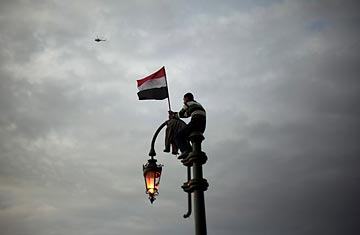
An antigovernment protester holding an Egyptian flag sits atop a lamppost in Cairo's Tahrir Square as a helicopter flies past on Friday, Feb. 4, 2011
Friday's demonstration demanding the ouster of President Hosni Mubarak was dubbed the "Day of Departure" — but while it succeeded in drawing hundreds of thousands of protesters into Egypt's streets, where they were joined by some surprising notables, it failed to live up to its name. As night fell on Cairo, with tens of thousands of protesters still chanting in Tahrir Square and the army protecting them despite their violation of curfew, there was no sign that Mubarak was about to pack his bags. Indeed, the regime's handling of the Feb. 4 protests in the capital, which passed off largely peacefully as the army held pro-Mubarak thugs at bay, seems to suggest that a certain stability may be settling into Egypt's instability.
The regime continues to defy demands from the streets, and internationally, that Mubarak step down immediately. But Mubarak has conceded that he will step down, insisting simply that he and his regime remain in charge during a transitional period until the election that will replace him by August or September. That's unacceptable to the many thousands in the streets, and the regime could be forced to make further compromises. But Mubarak and his powerful Vice President and intelligence chief Omar Suleiman are betting that by offering dialogue and cooperation with the opposition and promising a final yet graceful exit from Mubarak in a matter of months, they can win over the middle ground. Many Egyptians wanting to see Mubarak gone are nonetheless increasingly frustrated by the turmoil's disruptions of daily life, most painfully their ability to earn, and the regime is hoping that their frustration will help pressure the protesters to back down.
"The regime is trying to wait out the protests, hoping that they die down and lose momentum, and peeling off and co-opting some elements of the opposition," says Michael Hanna, a Middle East fellow at the Century Foundation in Washington. "It's a divide-and-conquer strategy, which hopes to drive a wedge between the protesters on the street and the silent citizenry, many of whom may be sympathetic but also fear the instability, criminality and disruption that they've seen over the past week and really want to go back to work. And their control of the state TV outlets, through which most Egyptians are following these events, may just help them do that."
A strategy of containing and defusing the protesters' challenge through attrition may militate against ordering a frontal assault to disperse them, because violence against peaceful crowds has generated sympathy from the wider public and from within the ranks of the military. Besides, massing in Tahrir Square under the watchful gaze and protection of the military doesn't in itself give the protesters the leverage to topple the regime, which may now be calculating that it can weather the challenge and strengthen its leverage in negotiating transitional political arrangements with opposition groups.
The current stalemate suggests that far from a Day of Departure in which Mubarak and cronies are suddenly sent packing, it's more likely that there will be a set of transitional arrangements ahead of new elections that will involve messy compromises from both sides. Compromise may perhaps be a tall order for those who have braved days and nights of sticks, stones and gunfire to hold Tahrir Square, they say, until Mubarak goes, but it would be less so for opposition leaders with an eye to the wider balance of forces. And there's little doubt that the military would prefer a stable political change in which order is maintained and its institutional interests are protected.
Prospects for further engagement toward some sort of political solution appeared to increase Friday with the presence of two key visitors. One was Mubarak's Defense Minister, Field Marshal Mohamed Hussein Tantawi, who chatted with soldiers helping maintain the peace and also with demonstrators. His message to them was to "tell the Muslim Brotherhood to sit and talk to the government"; he added that Mubarak "told you he won't run for another presidential term."
Even more interesting than Tantawi was the second visitor to arouse the crowd's enthusiasm, Arab League Secretary General Amr Moussa. Moussa, a former Egyptian Foreign Minister, is unlikely to have been sent to the square by his current employers — the likes of Saudi Arabia, Jordan, Syria and Yemen have little reason to show support for people protesting to bring down a long-established Arab autocracy. But Moussa makes no secret of his political ambitions, and he's very popular on the Egyptian streets for vocally challenging the U.S. invasion of Iraq and Israel's crackdowns on Palestinians while he served as Mubarak's Foreign Minister. Indeed, conventional wisdom in Egypt holds that it was precisely because of his popularity that Mubarak shunted Moussa off to the Arab League. "Moussa was popular for standing up to the Americans and to Israel," says Hanna, "expressing what many people felt were more authentically Egyptian views than those of a foreign policy in which Egypt is nothing more than an adjunct of the U.S."
With the intentions of leading opposition figure Mohamed ElBaradei unclear, Moussa has signaled that he's willing to put himself forward as a transitional President, in the event that Mubarak departs before September, or as a candidate to replace him in a new election. That won't be much comfort to those in Washington concerned about a post-Mubarak Egypt adopting an independent foreign policy. Indeed, Moussa has the rare distinction among contemporary Egyptian politicians of having been lionized in a chart-topping pop-music tune. That would be Shaaban Abdel Rahim's 2000 smash hit "I Hate Israel, I Love Amr Moussa."
